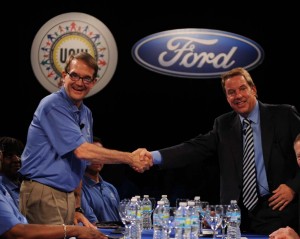Though the final tally won’t be released until later today it is now clear that the Ford Motor Co.’s tentative contract with the United Auto Workers Union will be approved.
Workers in Louisville, Kentucky accepted the agreement yesterday, and though the votes at a few small plants were still being tallied it was mathematically ensured that the 4-year settlement will take effect. The contract had generated significant opposition and, with workers at several key plants turning thumbs down it briefly appeared the contract would be rejected, possibly triggering a strike.
The new contract, which will cover Ford’s 41,000 U.S. hourly workers, gave both sides the opportunity to claim victory, with Ford committing to increase investments in the country and add new jobs but the union accepting that the agreement had to maintain the maker’s cost competitiveness.
As a result, there were no raises for the majority of workers – though those being hired in under a second-tier wage program will see wages rise, on average, by about $3 an hour over the life of the agreement. The new contract does provide a $6,500 up-front signing bonus. And that compares with $5,000 at General Motors – which settled with the UAW in September – and just $3,500 at Chrysler.
The contract also provides an enhanced profit-sharing program and additional bonuses designed to offset the impact of inflation. But the union provided terms that improve productivity and which are expected to maintain or even lower the effective impact of labor on overall manufacturing costs.
The automaker, in turn, agree to add close to 6,000 jobs and make an additional $6.2 billion in investments in its U.S. operations – beyond about $10 billion it had already announced prior to the contract settlement earlier this month.
Nonetheless, many workers opposed the settlement, arguing that they deserved to get back the concessions they had made since 2007, when their last formal contract was approved. There was particular pressure on union bargainers to eliminate the two-tier wage system, something Ford ultimately blocked.
Workers cited Ford’s strong profits – it is now considered the healthiest of Detroit’s Big Three. They also pointed to the tens of millions of dollars in salary, bonuses and stock options taken by CEO Alan Mulally for 2010.
Workers at several key plants, including the one in Chicago producing the popular Ford Taurus, rejected the agreement and at one point last week, it appeared the contract’s fate might depend on what happened at Louisville and the big Rouge manufacturing complex near Ford’s suburban Detroit headquarters.
“Ford is rolling in profits and Wall Street is tickled to see this contract. But we don’t even get the concessions back–from COLA, to Annual Improvement Factor, through apprenticeships,” noted a leaflet circulated inside the Rouge in an attempt to generate a “no” vote.
UAW leaders, including President Bob King, actively lobbied local union officials to encourage workers to approve the contract – a bid that appears to have turned the tide.
A rejection of the Ford contract would have forced negotiators back to the bargaining table. It might have also resulted in a strike. The number two maker is the only one of the Detroit manufacturers where that would have been possible, in fact, the federal bailouts of GM and Chrysler barring the UAW from striking for economic reasons.
Ford has generally had the best relations with the UAW, however, and hasn’t seen a walkout by the union since Gerald Ford was president.
The vote at Ford is expected to influence what workers do at Chrysler, where a settlement was belatedly hammered out last week. That agreement also calls for new jobs and investments but provides even less cash for workers reflecting the smaller maker’s ongoing financial problems.

